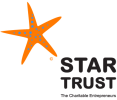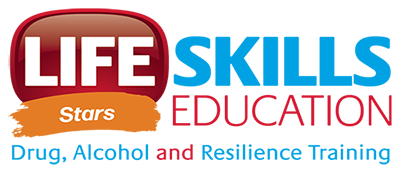STaRS
The Life Skills STaRS programme is a PSHE teaching and learning resource for children in :
- Year 1 (Little Stars) – Available Now
- Year 2 (Super Stars) – Available Now
- Year 3 (Shooting Stars) – Coming Sept 2024
- Year 4 (Mega Stars) – Coming Sept 2024
Preparing our children to make safe and
healthy choices in the future, across 6 lessons
per year group.
What is STaRS?
The Life Skills Stars programme has been written by teachers for teachers responding to your needs and those of the children as they grow up in an everchanging world.
The topics covered tackle key areas of the PSHE and computing curriculum as well as areas teachers feel are important for the children of today.
The STaRS Journey…
The journey begins in KS1 with our Stars programme (formerly called ‘On Track’) and continues into Lower KS2 (‘Keep on Track’).
These programmes prepare your pupils perfectly for our DAaRT programme – a 10 week programme delivered in Year 5 or Year 6. Web Warriors – an online safety programme complements this end of Primary school learning.
What areas are covered by Life Skills STaRS?
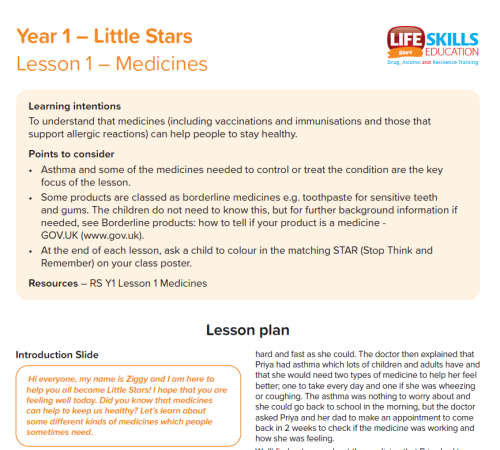
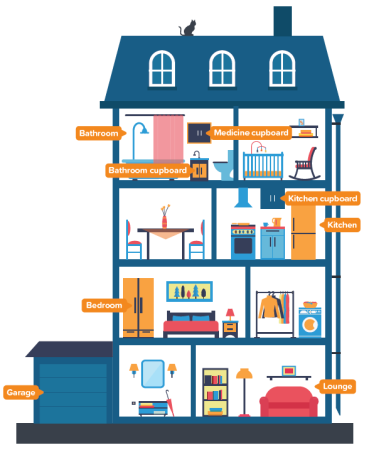
Through consultation with current KS1 teachers, we have focused learning around the topics of:
- Medicines
- Feelings
- Staying safe at home
- People who help us
- Risk and consequence
- Staying safe on computers/online.
The programme aims to address identified risks that children face in everyday life as they strive to make safe and healthy choices.
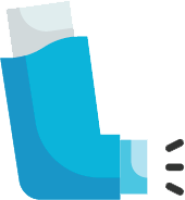
How does it work ?
Lessons are introduced and concluded by a fun, animated character, Ziggy the Resili-Ant. Ziggy also features in our other programmes for Years 3 and 4 and our Drug, Alcohol and Resilience Training (DAaRT) programme for Years 5 and 6.
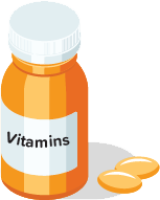
Six Lessons per Year Group
Each of the 30-45 minute lessons focuses on a story, which generates discussion and leads to learning tasks, whilst extension activities support learning at all levels of ability. All lesson plans, resources and supporting worksheets are available to download from our programme resource area.
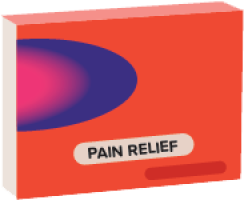
Programme Progression
The Life Skills Stars programme encourages children to Stop, Think and Remember (STaR) and children are rewarded with whole class stars as they complete each lesson, which are displayed on a poster. Certificates are available for each child as they complete the Little Stars and Super Stars programmes.
Practicing the skills of being safe and healthy
Stop
Think
and
Remember
Measuring Impact…
Are we STaRS too?
We ensure that our products follow the International Standards first set out by the United Nations Office on Drugs and Crime (UNDOC). These standards are intended to enable commissioners, policymakers and schools to have confidence that a product is based on the ‘common characteristics of interventions and policies that have been found to yield positive outcomes’.
Impact against our outcomes is measured in multiple ways across all of our programmes. This programme is brand new, and so after completing the STaRS programme, we would ask you to take 5 minutes to complete the questionnaire here. We will evaluate your responses to ensure we are achieving our intentions and reaching the outcomes identified below. Thank you for your support.
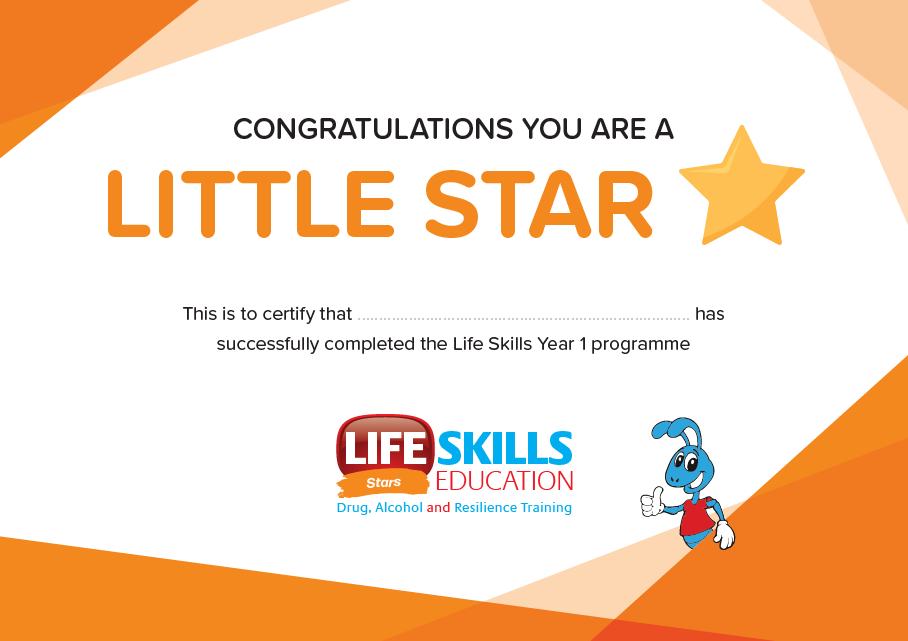
‘What’s at the end of each year?’
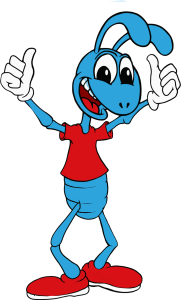
A Celebration!
Help and support your young people to celebrate their learning at the end of each programme. How? Glad you asked.
- Print and present celebration certificates at an assembly
- Get your young people to write a small report on what they have learnt
- In small groups, create role plays around the topics they have discussed
- Create a STaRS resource sheet celebration wall
- Ask your STaRS how to celebrate!
-
Little STaRS (Year 1)
Lesson # Learning Intentions and expected outcomes National Curriculum Links 1. MedicinesChildren understand that medicines (including vaccinations and immunisations and those that support allergic reactions) can help people to stay healthy.
PSHE – Health and Well being – Healthy lifestyles ( physical well being) Medicines2. Feelings and friendshipChildren understand how our actions and words can affect others.
PSHE – Health and Well being – Healthy lifestyles ( Mental health) Feelings3. People who help us stay healthyChildren understand there are a range of people who help us to stay healthy.
PSHE – Health and Well being – Healthy lifestyles ( Keeping safe) job to keep us safe.4. RiskChildren recognise risk in simple everyday situations.
PSHE – Health and Well being – Healthy lifestyles ( Keeping safe) Risk5. Staying Safe at Home (houshold products)Children learn about how to keep safe at home.
Children understand that household products (including medicines) can be harmful if not used correctly.
PSHE – Health and Well being – Healthy lifestyles ( Keeping Safe) Home6. Computer safetyChildren recognise the risks of using computers and what to do to avoid these risks.
Children develop an understanding of who to turn to for help and what things we can do to keep us safe online.
PSHE – Health and Well being – Healthy lifestyles ( Keeping Safe) online safety -
Super STaRS (Year 2)
Lesson # Learning Intentions and expected outcomes National Curriculum Links 1. MedicinesChildren understand that medicines (including vaccinations and immunisations and those that support allergic reactions) can help people to stay healthy.
Children know about things that people can put into their bodies or on their skin and that these can affect how people feel.
PSHE – Health and Well being – Healthy lifestyles ( physical well being) Medicines in body/on skin2. Feelings – stress and worryChildren recognise when we are stressed or worried about something and how to help ourselves feel better.
PSHE – Health and Well being – Healthy lifestyles ( Mental health) Stress and worry3. People who help us… Support NetworksChildren understand there are a range of people who help us to stay healthy.
Children know who and how we can call people for help in an emergency.
PSHE – Health and Well being – Healthy lifestyles ( Keeping Safe) Emergencies and accidents4. Risks & ConsequencesChildren recognise risk in simple everyday situations and what action to take to minimise harm.
Children understand that our actions may lead to positive and negative consequences.
PSHE – Health and Well being – Healthy lifestyles ( Keeping safe) Risk5.Staying Safe at Home (medicines)Children know how to keep safe at home.
Children understand that household products and medicines can be harmful if not used correctly.
PSHE – Health and Well being – Healthy lifestyles ( Keeping Safe) Home and medicines6. Online safetyChildren recognise there is some information about ourselves that we need to know but that we need to be careful who we tell.
Children understand that we need to keep ourselves safe while working online in the virtual world.
Children develop an understanding of who to turn to for help and what things we can do to keep ourselves safe online.
PSHE – Health and Well being – Healthy lifestyles ( Keeping Safe) online safety

